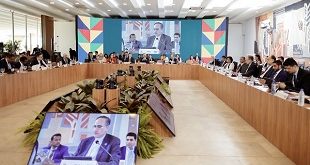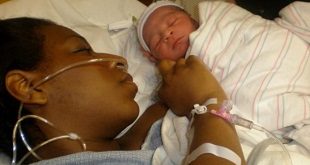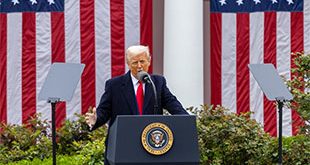
By Haggai Matsiko
President challenged on his military coup warning
On Jan. 27, President Yoweri Museveni made remarks that have become a talking point and renewed debate about how his long stay in power will end. Museveni, who has been in power for 28 years, while addressing a judges conference in Entebbe, scoffed at “idiots” who say that the NRM government can be overthrown by arms. “Some of these people are just idiots…”the president said, “They just go around that they want to overthrow the Uganda government, Uganda government to overthrow it? Oooooh! You don’t know what you are talking about…the NRM government to overthrow it with arms, but that is our speciality.”

Later, the President told MPs from his ruling party; specifically those who intended to challenge him, that he is a “war general that cannot easily be removed”.
Analysts say Museveni’s comments show he is constantly mulling his vulnerability to a coup which by nature is organised secretively and often catches those in power by surprise.
Museveni appears confident that he cannot be ousted by a revolution or revolt because, in his own word, he has tamed the opposition.
Instead, he fears a coup because this forceful seizure of the machinery of state government can be by `insiders’ within his government.
Makerere University political scientist, Lumumba Bwire told The Independent that Museveni’s coup talk shows the president’s false self-confidence and make him look a bad student of the country’s political history.
All eight governments in Uganda, except two, since independence in 1962 have been over-thrown in a coup. The country had the highest number of coups in the region; an average of a coup for every 6 years, before Museveni grabbed power in a coup in 1986.
“Any government can be overthrown especially in Africa,” Lumumba says, “it is only extreme democracies and totalitarianisms that cannot be overthrown.”
Bwire explains that contrary to Museveni’s bravado, there are only two cases of governments that cannot be ousted in a coup; an extreme democracy, where people are very happy with the government and do not want to overthrow it or a totalitarian government, which has completely suppressed all forms of dissent and is in full control.
“Uganda is none of these,” the scholar says, “It (Museveni’s government] has one leg in democracy and another in totalitarianism. And it is only a matter of time until those who are discontented rise up.”
Bwire says the late former President Milton Obote had similar false confidence regarding his government’s susceptibility to a military coup.
Writing in 1968 in his Myths and Realities: Letter to a London Friend, Obote had bragged: “As regards the position of the Ugandan army, the position of the Ugandan army, I am perhaps the only African leader who is not afraid of a military take over.”

At the time Obote had battered the opposition and outmanoeuvred both the army and his party, the Uganda Peoples Congress (UPC).
But just two years later, Gen. Idi Amin, an army officer he had groomed and put in charge, overthrew him.
Museveni too appears to have out-manoeuvred the opposition, to have total control of the army, and his party; the National Resistance Movement (NRM).
“He is drunk with power,” Bwire says, “that is why he wrongly imagines that he cannot be overthrown. That is what overstaying in power does, it makes leaders feel indispensable.”
John Kazoora, a retired major of Museveni’s army, also sees similarities between Museveni and Obote.
“You see Obote made the same remarks because he had an army from northern Uganda, it is the same army that ousted him,” he says.
Maj. Kazoora, once an insider who is now an opposition politician, is a clear sign of chinks in Museveni’s army.
Other `insiders’ that have recently broken with Museveni include Gen. David Ssejusa aka Tinyefuza who, for eight years, was Museveni’s Special Advisor and Coordinator of Intelligence. He fled the country in May 2013 and has joined opposition. Another is Maj. Benon Biraaro who has announced that he will challenge Museveni in the 2016 presidential race.
“Did you think Gen. Sejjusa would ever say the kind of things he is saying?” Kazoora asks, “Did you think Biraaro would ever say the things he is saying?”
In 2010, President Yoweri Museveni was forced to negotiate with his little-known former bodyguard; one Capt. Ruhinda Maguru, who had vowed to challenge him for the flag-bearer position in the party. Maguru was illegally blocked from blocking Museveni. He sued and was paid off in an out of court settlement.
Museveni’s main challenger in all elections since 2001 has been retired army Col. Dr. Kizza Besigye, a former Museveni personal physician and confidant.
Gen.Mugisha Muntu who replaced Besigye as leader of Uganda’s biggest opposition party and is likely to challenge Museveni in 2016 is also a former ‘insider”. He was army commander under Museveni.
Museveni has reacted to vulnerability of his government in the army by increasing concentrating command around his son; Brig. Muhoozi Kainerugaba.
Two years ago, Museveni had the Special Forces, headed by Muhoozi re-structured into the Special Forces Group.
Although slimmer, the SFG is much better trained and has several units that are said to be even better equipped—it is a full-fledged army. The SFG is also the army in charge of critical government installations and special assignments.
Its several specialised units; counterintelligence, artillery and motorised infantry traits, show how well it is being chiselled and positioned.
It is such actions that make coups inevitable, according to Prof. Paul Collier and Anke Hoeffler. Basing on data from over 100 countries, the prominent scholars note that: “a standard technique of dictators is to protect themselves from their own military by constructing parallel military organisations”.
“For example, the secret police and the presidential guard are given a military capability matching both each other and that of the army, so that no one organisation is sure of being able to win if it launches a coup. An enlarged military budget enables such a system of military duplication,” they note in a study entitled: `Coup Traps: Why does Africa have so many Coups d’Etat?’
The scholars also show that ethnic and religious divisions, political repression, a wide gap between the rich and the poor, and the ability with which a rebel force can mobilise resources explain a country’s proneness to coups and civil war. Uganda appears to meet most of these conditions.
But duplication in Uganda’s security services goes beyond Collier’s description.
Uganda has at one point had over 20 security agencies including; the External Security Organisation (ESO), the Internal Security Organisation (ISO), the Chieftance of Military Intelligence (CMI), CIID, the Joint Anti-Terrorism Taskforce (JATT), the Joint Intelligence Committee (JIC), Rapid Response Unit (RRU), Special Revenue Protection Unit (SRPU), Popular Intelligence Network (PIN), among others.
Such a system, with its lack of unified command, has the advantage of counter-balancing each other. But it can be a harbinger for trouble if any part is infiltrated by coup-makers who will be orgainsed with clear targets.
The alternative; over centralisation of power and decision-making around himself, is also not coup-proof for Museveni according to analysts and scholars.
In the event of a coup, instead of following well laid chains of command, state operatives could fail as they await orders from Museveni and his “inner circle” which might have been immobilised.
Commenting on Museveni’s installing young commanders that he feels are loyal to him in key positions, a political science lecturer from Makerere University, Sabitti Makara, says it should not make Museveni feel invincible.
“If military might were anything to boast of, Egypt’s [Hosni] Mubarak and Libya’s [Col. Mammar] Gaddafi would not have gone the way they did. Gaddafi was not just mighty in Libya but the whole of Africa as you know.”
Lumumba agrees. He says that in terms of military might, which is the key to protecting a state, Uganda has no army to speak of because the army is “semi-professional and depends on other countries for guns and basic things like uniform”.
“You cannot brag of such an army,” Lumumba argues, “because if the superpowers wanted to kick Museveni out of government, there is nothing this army can do, it would just take minutes.”
But maintaining the different military and security outfits poses another danger, according to Collier and Hoeffler. It costs too much. Yet spending keeps rising in response to the risk of rebellion.
It is a vicious cycle as the “high government military spending indicates that the government is planning to rule by repression rather than by inclusion and this can provoke calls for rebellion”.
After 28 years in power, observers argue, Museveni knows that gross corruption, political repression and other issues have fomented opposition to his government.
To contain his opponents, Museveni has unleashed security operatives—and boasts that his police chief, Gen. Kale Kayihura, has stocked up enough tear gas.
Top opposition politicians like Kizza Besigye are not allowed free movement —security operatives have put them under constant surveillance.
But, observers note, using physical coercion to secure compliance of the ruled and money to buy off voters are signs of the government’s vulnerability.
Besigye says Museveni’s government is doing exactly what Museveni fought against, attracted support to him, and led him to overthrow Obote’s regime.
Besigye, who has run against Museveni thrice, says the opposition cannot dislodge Museveni through an election “he organises, supervises and controls”. He told The Observer newspaper that the solution is now only one: “awakening people to confront the regime, to bring it down, not through an election but through organising defiance with the people of Uganda.”
In response, Museveni says he has “returned democracy to Uganda” and ensured regular elections for all political positions.
But scholars and critics all say that elections under his government are just ritualistic performances to allow him stay in power.
Kazoora who authored the book “Betrayed by My Leader” makes the same point.
Kazoora says: “If he [Museveni] is such a strong general who can’t be overthrown, why does he coerce MPs to block others from contesting against him, why does he fear voters?”
Kazoora said this after the February 11 NRM caucus meeting at Kyankwazi in which MPs signed a petition endorsing Museveni as the sole party flag-bearer in the scheduled 2016 elections.
The move effectively blocked NRM party Secretary General, Amama Mbabazi, who is also the prime minister and an “insider”, from challenging Museveni.
Mbabazi, although not a soldier, is said to have used his position to create a network of highly influential people loyal to him in the army, civil service, army, police, and other security and intelligence organisations. It is not clear how Mbabazi’s network will react to the fall of the man who once boasted of being at the head of the “queue” to succeed Museveni.
Collier and Hoeffler; in another paper entitled, `Greed and Grievance in Civil War’ appear to show a case like Mbabazi’s can contribute to causes for a military coup.
“The other likely incentive for a violent challenge to the state is grievance against it,” they note.
Makara agrees.
He says if Museveni is serious about preventing his government from being overthrown, he must focus on democratising the country.
For as long as Museveni’s government continues to squeeze space for democratic contestations and competition, Makara adds, his government can be overthrown anytime.
This is because, Makara says, in a situation where freedoms to campaign are very limited, media is gagged and votes are being bought, other parties do not see a possibility of attaining power and resort to violent means.
Makara says Museveni should open up political space, contest freely in elections and in a way that is acceptable.
“That is how he is going to prevent a coup,” he says.
 The Independent Uganda: You get the Truth we Pay the Price
The Independent Uganda: You get the Truth we Pay the Price



